2019 PMLA winners, shortlist and judges
The winners, shortlistees and judges of the 2019 Prime Minister's Literary Awards.
Judges 2019
Nonfiction and Australian history panel
Professor Lynette Russell AM (Chair)
Helen Trinca
Emeritus Professor Richard Waterhouse FRSN FAHA FASSA
Professor Greg Melleuish
Dr Sally Warhaft
Fiction and poetry panel
Professor Bronwyn Lea (Chair)
Dr James Ley
Susan Wyndham
Associate Professor Sarah Holland-Batt
Kathy Shand (2017 & 2018)
Children’s and young adult literature panel
Professor Margot Hillel OAM (Chair)
Joy Lawn
Margrete Lamond (2017 & 2019)
Professor Robyn Ewing AM
Sue Whiting
Kerry Neary (2018)
Young adult literature
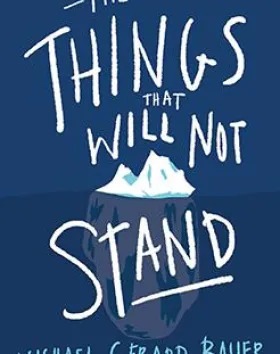
WINNER: The Things That Will Not Stand – Michael Gerard BauerCicada – Shaun Tan
The Things That Will Not Stand
WINNER
Shortlist year: 2019
Shortlist category: Young adult literature
Published by: Omnibus Book an imprint of Scholastic Australia
Sebastian is at a university open day with his best friend Tolly when he meets a girl. The wrong girl. Her name is Frida, and she's edgy, caustic and funny. She's also a storyteller, but the stories she tells about herself don't ring true, and as their surprising and eventful day together unfolds, Sebastian struggles to sort the fact from the fiction. But how much can he expect Frida to share in just one day? And how much of himself and his own secrets will he be willing to reveal in return?
About the author
Michael Gerard Bauer
Michael Gerard Bauer was born in Brisbane and taught English and Economics in a number of schools in the Brisbane–Ipswich region for more years than he cares to admit before resigning from full-time teaching in 2000 to pursue his dream of being a published writer. Michael is now a full-time writer.
Judges’ comments
'With life it's all over the place. One minute it's tears. Next minute it's laughter.'
A university future students open day provides the setting for an eventful day of both tears and laughter, humour and pathos, as sixteen year old Sebastian and his best friend Tolly seek guidance about potential future careers. The boys enjoy a deep friendship and share a mantra adapted from the film The Big Lebowski, 'these things will not stand' when they confront something that they believe cannot go unchallenged.
The story is narrated in the present tense by Sebastian (Seb) and opens with a reference to the movie Sliding Doors suggesting to the reader that a romantic comedy is ahead, although the ensuing narrative becomes much more creative and complex through the use of a range of authorial devices including stream of consciousness and flashbacks.
Seb is a Film Studies student hoping to reconnect with the 'right girl,' a Taylor Swift lookalike, who he had met briefly in a lecture, at a screening of Casablanca.Instead, he meets 'Frida' whose quick wit and resourcefulness rescues him from embarrassment when the 'right' girl actually does arrive to see another movie, accompanied by her boyfriend.
Over the course of this one day Michael Gerard Bauer explores the role that trust, honesty and the sharing of stories plays in the development of a new relationship. Each character is well drawn and the conversations authentic. Seb and Frida gradually push each other to share some of their past lives including some experiences they would have preferred to keep hidden. How much is Seb prepared to reveal about himself and his past? Is there something awry with Frida's accounts of her life and schooling?
The narrative is never heavy-handed, bleak or issues-driven. The revelations and their legacies are balanced by surprising and, at times, almost comical events as the day continues, as well as times of joy and music. There are unexpected moments when seemingly ordinary human beings behave like superheroes to rescue those they care about.
The final poignant sandpit scene completes the building of the Sliding Doors concept and suggests that despite the ups and downs of life and the uncertainties of the future, there can be a new beginning.
The Things That Will Not Stand is an honest, thought-provoking and hopeful novel. Its unexpected twists and turns make it impossible to put down. The story celebrates the courage and resilience of these young adults and reminds us of the importance of family and friendship in helping overcome pain and loss. We are challenged to reflect on whether it is time for all of us to question the things that are unacceptable and should not stand.

Lenny’s Book of Everything – Karen Foxlee
Lenny's Book of Everything
Shortlist year: 2019
Shortlist category: Young adult literature
Published by: Allen & Unwin
Lenny's younger brother has a rare form of gigantism and while Lenny's fiercely protective, it isn't always easy being the sister of 'the giant'. A book about finding good in the bad that will break your heart while raising your spirits in the way that only a classic novel can.
About the author
Karen Foxlee
Karen Foxlee writes for both kids and grown-ups. Her first novel The Anatomy of Wings won numerous awards including the Dobbie Award and the Commonwealth Writers Prize for Best First Book. Ophelia and the Marvellous Boy, Karen's first novel for children, was published internationally to much acclaim while her second novel for younger readers, A Most Magical Girl, won the Readings Children's Fiction Prize in 2017 and was Children's Book Council of Australia shortlisted the same year.
Judges’ comments
When Lenny's brother is born in Ohio, six days after the 1969 moon walk, everything seems perfect except for her mother's sense of foreboding. The 'dark heart feeling' persists, and after five years is justified: Davey suffers from gigantism. It is the result of complex tumours wrapped around his pituitary gland that disrupt his growth hormones and initiates unnatural and unstoppable growth. When Davey dies, just prior to his eighth birthday, he is 6' 5" tall.
Lenny's Book of Everything spans the three years between the outward manifestation of Davey's condition and his death, and the unfolding story is charted with chapter-by-chapter records of his age and rapidly increasing height. Central to the telling is the periodic arrival of a serialised encyclopaedia, around the contents of which Lenny's and Davey's imaginations revolve, obsessions develop and domestic feuds manifest. The narrative unfolds with childlike jumps of association from one subject to another, making temporal leaps across paragraph and chapter breaks in an escalation of scenarios. Day to day life in their cramped apartment, interactions with their motley crew of neighbourhood shopkeepers, their neighbour Mrs Gaspar and her prophetic dreams are juxtaposed with more serious life issues: their vanished father, their mother's nerves and anguish, Davey's unmanageable hugeness and decline, the ultimate compassion of the community in times of sorrow and hardship, and Lenny's own resentment, frustration, shame, rebellion and sisterly protectiveness.
Lenny's first-person narration is a masterful combination of clear-eyed childhood honesty and the more mature tone of an older narrator reflecting on a segment of that childhood. Towards the end of Davey's life, when he is blind and pees on the floor instead of into the toilet bowl and Lenny is angry at having to clean it up, she crisply remarks 'You don't become someone perfect just because your brother is dying. You stay the person you are and all your good and bad bits are magnified.' This subtle mix of remorse and remorseless honesty is maintained throughout in a multifaceted exploration of the nuances of sibling love, rivalry, devotion and cruelty, making Lenny's Book of Everything a rare and outstanding novel that seamlessly crosses boundaries and speaks to readers of all ages.
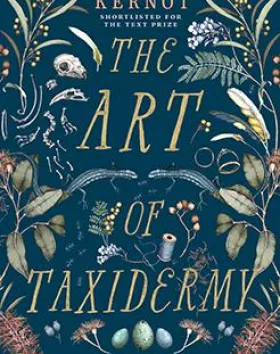
The Art of Taxidermy – Sharon Kernot
The Art of Taxidermy
Shortlist year: 2019
Shortlist category: Young adult literature
Published by: Text Publishing
Lottie is fascinated with death. She collects birds, lizards and other small dead animals she finds, trying preserve them, to hold onto the life they once had. Her aunt tries to put a stop to this worrying obsession, but her father can see a scientist's mind at work, and he introduces her to the art of taxidermy. The beauty and tenderness Lottie finds in her preserved creatures provide a way for her to feel close to the mother she lost. An exquisitely imagined verse novel about sadness, and the way art can help us make sense of it all.
About the author
Sharon Kernot
Sharon Kernot writes poetry and fiction. Her work has appeared in a variety of journals, magazines and anthologies including Island, Mascara Literary Journal, Best Australian Poems, and Australian Love Stories.
Judges’ comments
This truly poetic and highly original free verse novel is an evocative exploration of death and loss, grief and sadness told through the eyes of Lottie, a child of a German immigrant family, and set against South Australia in the 1960s.
Lottie is fascinated with dead things. She has experienced many losses in her life, including the death of her mother, but it is in the starkness of the Australian landscape and the beauty she can see in it, and in the dead animals she finds there that Lottie finds solace and eventually a path towards healing.
Sharon Kernot's poems are lyrical, filled with exquisite imagery and detail. Her depiction of the natural world is to be particularly commended. She constructs her poems with great originality and confidence, luring the reader into Lottie's world, her isolation and loneliness, her sadness. Her poetic vignettes gradually reveal the tragedies that Lottie and her family have endured, these sad truths bubbling to the surface in small shocks and surprises as the narrative progresses—in a kind of 'literary osmosis'.
Woven through this tale of death and grief, Kernot has layered in a rich backdrop of the life and times of the 1960s. Secondary characters are beautifully drawn and all play an important role within the novel. Imaginary friend, Annie, and real friend, Aboriginal boy Jeffrey, illuminate Lottie's loneliness and isolation. In Jeffrey, Lottie finds someone who feels equally isolated and different, and someone with whom she can confide in, while also revealing the racism of the period and the impact of the Stolen Generations. Her Oma speaks to the migrant experience and the impact of German internment during Second World War and Aunt Hilda highlights the gender expectations of the era.
While Aunt Hilda's actions are often cruel and seemingly heartless, she is well intentioned. She is doing her best to fulfil the mother role for Lottie and to guide her away from her disturbing obsession and into more fitting pursuits for a young lady—namely, knitting. Lottie's clashes with Aunt Hilda provide opportunities for some dark humour, with Lottie being both compliant and rebellious. Lottie's father is distant at times, dealing with his own grief, but he is also stoic and, while understanding Hilda's worries, he is quietly supportive of Lottie and her obsession. He sees a scientist's mind emerging and introduces her to the art of taxidermy.
This ultimate preservation of dead animals through taxidermy gives Lottie a pathway towards healing and an understanding of death—by preserving dead animals she feels she is honouring them and preserving the memory of them.
With exquisite cover art and interior pencil sketches by Edith Rewa, superb design and production values, and of course, a beautifully told and deeply moving free verse narrative, The Art of Taxidermy is an outstanding addition to Australian young adult literature.
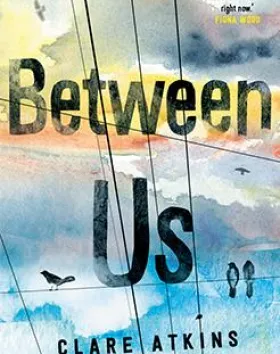
Between Us – Clare Atkins
Between Us
Shortlist year: 2019
Shortlist category: Young adult literature
Published by: Black Inc
Is it possible for two very different teenagers to fall in love despite high barbed-wire fences and a political wilderness between them? Anahita is passionate, curious and determined. She is also an Iranian asylum seeker who is only allowed out of detention to attend school. On weekdays, during school hours, she can be a 'regular Australian girl'. Jono needs the distraction of an infatuation. In the past year his mum has walked out, he's been dumped and his sister has moved away. Lost and depressed, Jono feels as if he's been left behind with his Vietnamese single father, Kenny.
About the author
Clare Atkins
Clare Atkins has worked as a scriptwriter for many successful television series including All Saints, Home and Away, Winners and Losers and Wonderland. Her debut novel, Nona & Me, received numerous awards and commendations, including being selected as the 2016 Book of the Year in the NT Literary Awards. Her second novel, Between Us, won the 2019 Children's Book Council of Australia Book of the Year for Older Readers award and was selected as IBBY Australia's 2020 Honour Book for Writing. Atkins wrote both her novels while she was living in the Northern Territory.
Judges’ comments
The cover of this book hints at the narrative within, with wires symbolising both confinement and a means of communication and the birds representing a freedom that Ana, one of the main characters does not have, confined as she is to a refugee camp.
Jono and Ana meet at school. He is the son of a Vietnamese refugee and she is a Muslim girl who has fled, with her family, the violence of her homeland. There are thus two generations of characters with refugee backgrounds interacting in this novel. As well as the trauma of her dislocation from her home, Ana is also grieving the death of her father who was killed in an outbreak of violence in Iran, violence which left the remainder of the family vulnerable and in danger.
This is a highly political book told as a powerful, polyphonic story. Each of the narrators tells their story in the first person allowing the reader to understand their inner thoughts and their reactions to the other characters. Unusually, in a young adult novel, one of the narrative voices is Kenny, Jono's father, providing an adult perspective on his own background as well as on the other characters and what is happening to them. It is clear that the other guards in the camp do not understand him or the detainees in the camp. This 'othering' of the refugees is an important aspect of the narrative. There is intertextuality too, the required reading at school also signifying lack of understanding and distancing from others' humanity. They are reading S.E Hinton's The Outsiders and John Marsden and Shaun Tan's The Rabbits.
A harrowing, unsentimental and unforgiving story, it ends with a sense of hope for Jono's family as they develop new understandings of each other but there is little hope for Ana and her family as they are moved to a different internment camp, disrupting their lives and the children's education. Signifying the closing in of her world is her narrative voice. Whilst Jono's becomes more articulate and expansive as his understanding of his father, his family background and Ana's life grows, Ana's becomes diminished and less expressive as her world is reduced. Ana describes her little brother as 'scared and scarred', terms which could be applied to all the members of her family.
Australian history

WINNER: The Bible in Australia: A Cultural History – Meredith Lake
The Bible in Australia: A Cultural History
WINNER
Shortlist year: 2019
Shortlist category: Australian history
Published by: NewSouth Publishing
In this surprising and revelatory history of the Bible in Australia, Meredith Lake gets under the skin of a text that's been read, wrestled with, preached and tattooed, and believed to be everything from a resented imposition to the very 'Word of God'. The Bible in Australia explores how, the Bible has played a contested but defining role in this country, in the hands of Bible-bashers, immigrants, suffragists, evangelists, unionists, writers, artists and Indigenous Australians.
About the author
Meredith Lake
Meredith Lake is a historian of religion, society and culture in Australia, with a PhD from the University of Sydney. She is the author of a high schoolers' guide to The Bible Down Under (2016), and a study in social welfare from the Great Depression to the present, Faith in Action: Hammond Care (UNSW Press, 2013). She has also written articles on Christianity and colonialism, including a prize-winning piece in the Journal of Religious History. She is a highly regarded speaker on religion and culture.
She was awarded the Australian History Prize in the 2019 NSW Premier's History Awards for The Bible in Australia.
Judges’ comments
It is often popularly assumed that Australia is a secular society, even as we debate the merits of religious freedom and the right to worship. The Bible in Australia presents, for the first time, a thorough examination of the broad cultural, political, and historical context that Christianity and the Bible have played in Australia since 1788. This is a vast and sweeping book that covers ground from the religiosity of new immigrants to the impact of the Bible, via missions and missionaries, on the world's oldest living culture. This is a highly original look at our past; a highly readable narrative that reminds contemporary Australians of the forces that shaped our culture. Lake is comprehensive in her analysis of the impact of the Bible on Indigenous culture, its role in frontier conflict, and its cultural impact on 'free' settlers, and reform movements in the late nineteenth and early twentieth centuries. Australia's shift towards secularism since the First World War and how the Bible has lost influence and favour is documented in meticulous detail. The lively, energetic and highly accessible writing covers a range of topics, including popular culture, music, unions and political activism. The Bible in Australia adds an extra dimension to our understanding of Australian religious and cultural history and addresses a significant gap in our collective knowledge.
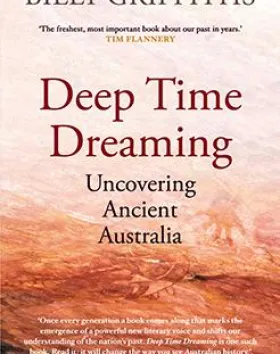
Deep Time Dreaming—Uncovering Ancient Australia – Billy Griffiths
Deep Time Dreaming—Uncovering Ancient Australia
Shortlist year: 2019
Shortlist category: Australian history
Published by: Black Inc.
Soon after Billy Griffiths joins his first archaeological dig as camp manager and cook, he is hooked. Equipped with a historian's inquiring mind, he embarks on a journey through time, seeking to understand the extraordinary deep history of the Australian continent. Deep Time Dreaming is the passionate product of that journey. It investigates a twin revolution: the reassertion of Aboriginal identity in the second half of the twentieth century, and the uncovering of the traces of ancient Australia.
About the author
Billy Griffiths
Billy Griffiths is a research fellow at the Alfred Deakin Institute for Citizenship and Globalisation. He is the author of The China Breakthrough and co-editor with Mike Smith of The Australian Archaeologist's Book of Quotations. His 2018 book, Deep Time Dreaming, received wide critical acclaim and won a number of awards including the John Mulvaney Book Award, the Ernest Scott Prize and NSW Premier's Literary Awards Book of the Year.
Judges’ comments
Understanding the deep history of the Australian continent is the purview of Indigenous Australians and archaeologists. In this elegantly written book, Billy Griffiths explores both the history of Australian archaeology and how non-Aboriginal Australia thought about that deep past, Indigenous Australians, their heritage, and their history. As Griffiths shows, there has always been a tension between archaeologists and Aboriginal people which has ebbed and flowed over the decades. In part, this is a consequence of a focus on scientific discoveries at the expense of the cultural. Through a study of individual, often colourful characters, this book maps the history of a discipline alongside the deep history of a continent. The contribution of figures like John Mulvaney are enhanced, and others such as Isabel McBryde are rightly restored and reinstated. The history of ancient Australia has put Aboriginal Australia on the global stage, and for this, all Australians can be rightly proud.
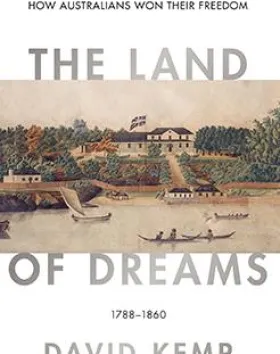
The Land of Dreams: How Australians Won Their Freedom, 1788–1860 – David Kemp
The Land of Dreams: How Australians Won Their Freedom, 1788–1860
Shortlist year: 2019
Shortlist category: Australian history
Published by: The Miegunyah Press an imprint of Melbourne University Publishing
The Land of Dreams tells the story of how Australians became a free people, gaining the liberties they desired to take control of their own lives, the right to govern themselves and the capacity to address their own political problems through democratic institutions. It reveals how Australians laid the foundations for one of the world's most successful countries, with unprecedented levels of personal liberty and social equality. It required a brilliant political campaign and from it Australia gained a national identity and political leaders who would write their constitutions, introduce democracy and later lead the fight for one Australian nation.
About the author
David Kemp
David Kemp's career spans both academia and practical politics. From 1990 to 2004 he was member of the Federal Parliament, and from 1996 he was a minister in the Howard government. Before entering Parliament he was Professor of Politics at Monash University, and after leaving Parliament Professor and Vice-Chancellor's Fellow at the University of Melbourne. He has published seminal books on voting behaviour and political analysis, and has written extensively on political liberalism, political ideas and Liberal Party icons such as Robert Menzies and Malcolm Fraser.
Judges’ comments
In The Land of Dreams, David Kemp shifts our understanding of Australian history as he explores the emergence of 'small L' liberal traditions, and the development of the modern political entity and nation—Australia. Covering a relatively short period, less than a century, from the arrival of the first fleet to 1860, this book is detailed, comprehensive and confident. There are three aspects to Kemp's freedom, the first arrives with the cessation of convict transportation to the eastern colonies. The next freedom is established with the shift to self-government (though still within the yoke of the British Empire), and the third represented by literate, white, male suffrage. Unlike other works about the settler phase of Australian history, war is not a dominant feature, nor is the focus on our convict roots. Kemp provides the historical-cultural context whereby the village, the settlement and the city, in various iterations provided the framework for Australian freedom and our liberal traditions. It is a unique and significant contribution to the Australian history canon.
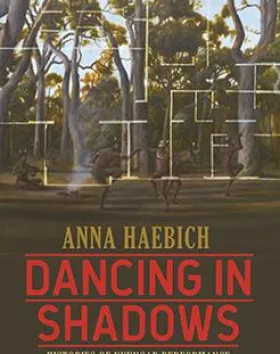
Dancing in Shadows—Histories of Nyungar Performance – Anna Haebich
Dancing in Shadows—Histories of Nyungar Performance
Shortlist year: 2019
Shortlist category: Australian history
Published by: UWA Publishing
Dancing in Shadows explores the power of Indigenous performance pitted against the forces of settler colonisation. Historian Anna Haebich documents how the Nyungar people of Western Australia strategically and courageously adapted their rich performance culture to survive the catastrophe that engulfed them, and generously share their culture, history and language in theatre.
About the author
Anna Haebich
Anna Haebich is a multi-award-winning author with a passion for history that pushes into new territories. She is best known for her challenging and compassionate Aboriginal histories, For Their Own Good and Broken Circles, which are classics in the field, but she also writes about women and crime, popular culture, visual arts and the environment. Her career combines university teaching, research, curatorship, creative writing and art practice. Anna is currently a John Curtin Distinguished Professor at Curtin University. Formerly she was foundation Director of the Centre for Public Culture and Ideas and Orbicom UNESCO Chair at Griffith University.
Judges’ comments
Anna Haebich is one of our nation's great interpreters of our collective Indigenous and Australian settler histories. She personifies the spirit of reconciliation, ethical research, commitment, and generosity. Dancing in Shadows is a tour de force, as it presents a wonderfully nuanced history of Nyungar performative responses to European invasion, incursions, dispossession, and various other interactions. Haebich shows us how these exchanges are neither linear nor one way and how Indigenous and newcomers influenced each other. The Nyungar performances are read as a form of entrepreneurship, not merely an adaptation of traditional cultural expression to new circumstances, but rather including the incorporation of European culture, assimilated and appropriated. The performances and in particular the dances were tailored for a new audience; they were statements about identity, culture, and economic empowerment. Dancing in Shadows illustrates why music is now so important to contemporary life and performance for Indigenous people.
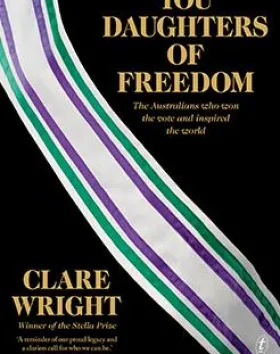
You Daughters of Freedom: The Australians Who Won the Vote – Clare Wright
You Daughters of Freedom: The Australians Who Won the Vote
Shortlist year: 2019
Shortlist category: Australian history
Published by: Text Publishing
When Australia's suffrage campaigners won the vote for white women, the world looked to this trailblazing young democracy for inspiration. Clare Wright's epic new historical work tells the story of that victory—and of Australia's role in the subsequent international struggle—through the eyes of five remarkable players: the redoubtable Vida Goldstein, the flamboyant Nellie Martel, indomitable Dora Montefiore, daring Muriel Matters, and artist Dora Meeson Coates. An award-winning author brings to life a time when Australian democracy was the envy of the world—and the standard bearer for progress in a shining new century.
About the author
Clare Wright
Dr Clare Wright is an award-winning historian and author who has worked as an academic, political speechwriter, historical consultant and radio and television broadcaster. Her most recent book, The Forgotten Rebels of Eureka, won the 2014 Stella Prize and the 2014 Mark and Evette Nib Award for Literature and was shortlisted for many other awards.
Judges’ comments
The role of Australian women at the forefront of the women's suffrage movement is deftly explored in this timely offering by Clare Wright. New Zealand is frequently cited as the first site where women were enfranchised; however, Wright makes an important distinction between the vote which both New Zealand and Australia allowed and the right to run for government, which was only possible in Australia. Through the mechanism of five individual personal stories, You Daughters of Freedom explores the intersection of the political and the personal. With an absorbing writing style, and narrative flourish Clare Wright has brought the forgotten women activists of Australia and world history to the fore. As these interwoven stories unfold, the audience is reminded that in the era leading to the emergence of the Gallipoli legend, Australian women were directing their energies to change both Australian and world political culture. The stories of the women in this book provide a deeper understanding of the politics and society of our own times and reveal an unknown aspect of Australian history.
Non-fiction
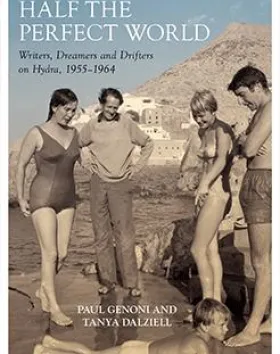
WINNER: Half the Perfect World: Writers, Dreamers and Drifters on Hydra, 1955–1964 – Paul Genoni and Tanya Dalziell
Half the Perfect World: Writers, Dreamers and Drifters on Hydra, 1955–1964
WINNER
Shortlist year: 2019
Shortlist category: Non-fiction
Published by: Monash University Publishing
This book tells the story of the post-war community on the Greek island of Hydra. It included Leonard Cohen and other artists and writers, such as the Australian literary couple, Charmian Clift and George Johnston. Drawing on previously unseen letters, manuscripts and diaries, and richly illustrated by the photographs of LIFE magazine photo-journalist James Burke, this book reveals the private lives and relationships of the Hydra expatriates. It charts the promise of a creative life that drew them to the island, and documents the fracturing of the community as it came under pressure from personal ambitions and wider social changes.
About the author
Paul Genoni
Paul Genoni works with the School of Media, Culture and Creative Arts at Curtin University. He is a former president of the Association for the Study of Australian Literature, and co-editor (with Tanya Dalziell) of Telling Stories: Australian Life and Literature, 1935–2012 (2013).
About the author
Tanya Dalziell
Tanya Dalziell works in English and Cultural Studies at the University of Western Australia. She is the author of Settler Romances and the Australian Girl (2004), and co-editor, with Karen Welberry, of Cultural Seeds: Essays on the Work of Nick Cave (2009).
Judges’ comments
Although Half the Perfect World documents the lives of two prominent post-war Australian literary exiles, it is also a book that addresses contemporary Australia, and our propensity for looking both outward and inward. In beautifully crafted prose, Dalziell and Genoni tell the story of George Johnston and Charmian Clift who lived on the Greek Island of Hydra in a bid to escape the cloying conservatism of 1950s Australia. Their story runs alongside that of other artists and writers, including the iconic writer and singer Leonard Cohen and his 'muse' Marianne Ihlen. Together these personal histories build a compelling and absorbing narrative of the tensions between creative ambition and domestic life. The authors document the complicated relations between the Australians and fellow artist exiles and the constant sense of alienation from Australia. Genoni and Dalziell's 'group biography' is underpinned by substantial scholarly research, including remarkable and new material from the Time LIFE archive. Half the Perfect World illuminates aspects of Australia's continuing relationship with Europe, reminding us that a little over half a century ago many Australians still looked to Europe for intellectual sustenance and culture. Their elegant writing recreates the time and place which shaped the strangely domestic, yet hedonistic lifestyles of Johnston, Clift and their social circle. The photographs are no mere embellishment but are analytical tools which offer a fresh take on their times and lives. This is a compelling read filled with big ideas and fascinating detail.
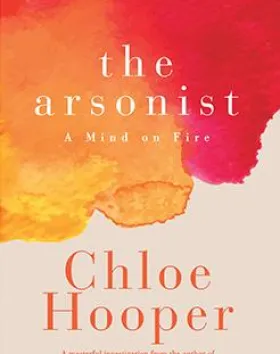
The Arsonist: A Mind on Fire – Chloe Hooper
The Arsonist: A Mind on Fire
Shortlist year: 2019
Shortlist category: Non-fiction
Published by: Hamish Hamilton an imprint of Penguin Random House
On the day that became known as Black Saturday, one man deliberately lit two fires near the small town of Churchill, Gippsland, then sat on the roof of his house and watched the flames. The Arsonist takes readers on the hunt for this man, and inside the strange puzzle of his mind. It is also the story of fire in this country, and of a community that owed its existence to that very element. A powerful real-life thriller written with lyric detail and nuance, The Arsonist is a reminder that in an age of fire, all of us are gatekeepers.
About the author
Chloe Hooper
Chloe Hooper is the author of two novels, A Child’s Book of True Crime and The Engagement, and The Tall Man, which won the Victoria, New South Wales, Queensland and Western Australian Premier’s Awards for Non-Fiction as well as the John Button Prize for Political Writing, and a Ned Kelly Award for crime writing. The Arsonist is her fourth book.
Judges’ comments
For Australians, nothing is more terrifying or ubiquitous than bush fires. In this fine book, Hooper explores the unthinkable, the mind of an arsonist. While it would be easy to approach this subject sensationally and judgmentally, Chloe Hooper instead focuses on understanding. Underpinned by meticulous research, this beautifully rendered book draws the reader into an unexpected journey. She combines vivid and terrifying descriptions of the fires and their impact, with an exploration of the social disadvantage that leads to the social disconnection of the arsonist both from his local community and society more generally. The complexity of the legal system, the social isolation of the perpetrator, and the ramifications of the events provide context for an intricate portrait of the arsonist, his actions and their consequences. With the eye of an incisive observer, Hooper weaves a powerful narrative that connects the very human obsession with fire, with the desire to be seen and noticed. This is a book that demonstrates the consequences associated with the inequalities of access to health care, legal representation and economic opportunity.
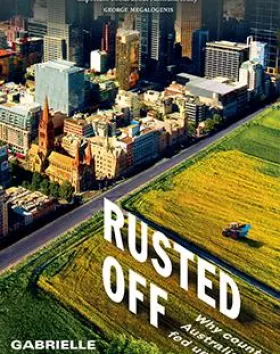
Rusted Off: Why country Australia is fed up – Gabrielle Chan
Rusted Off: Why country Australia is fed up
Shortlist year: 2019
Shortlist category: Non-fiction
Published by: Vintage an imprint of Penguin Random House
In Rusted Off, Gabrielle Chan looks to her own rural community's main street for answers to the big questions driving voters. Why are we so fed up with politics? Why are formerly rusted-on country voters deserting major parties in greater numbers than their city cousins? Can ordinary people teach us more about the way forward for government? In 1996, Gabrielle, the city-born daughter of a Chinese migrant, moved to a sheep and wheat farm in country New South Wales. Here, she provides a window into her community and reflects on its lessons for the Australian political story.
About the author
Gabrielle Chan
Gabrielle Chan has been a journalist for more than 30 years. She has been a political journalist and politics live blogger at Guardian Australia since 2013. Prior to that she worked at The Australian, ABC radio, The Daily Telegraph, and in local newspapers and politics. Gabrielle has written and edited history books, biographies and even a recipe book.
Judges’ comments
The divide between Australia's cities and rural towns is often romanticised and mythologised. In this timely book, the clash between the city and the country is shown to include a complex interplay of social, economic and cultural forces Chan writes as an insider, with an outsider's sensitivity. Chan moved from the city, where she worked in the Canberra press gallery, to the country some years later when she married a farmer. Rusted Off presents a sympathetic and insightful account of the lives of the people in a struggling and troubled country town. It is a portrait about a too often neglected demographic of Australian literary life. Chan challenges us to understand the economic difficulties facing those living in the country and urges a national response. This book provides a sensitive portrayal of the class structure of country towns and reveals the deep social and economic divide between the cities and many rural disadvantaged communities.
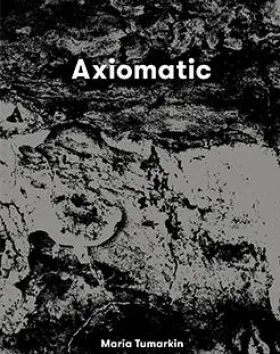
Axiomatic – Maria Tumarkin
Axiomatic
Shortlist year: 2019
Shortlist category: Non-fiction
Published by: Brow Books
Axiomatic is a boundary-shifting fusion of thinking and storytelling which takes as its starting point five axioms. These beliefs about the role the past plays in our present are often evoked as if they are timeless and self-evident truths. It's precisely because they are neither, yet still we are persuaded by them, that they tell us a great deal about the forces that shape our culture and the way we live. More than eight long years in the making, and utilising her time as a Sidney Myer Creative Fellow, Axiomatic actively seeks to reset the non-fiction form in Australia.
About the author
Maria Tumarkin
Maria Tumarkin is a writer and cultural historian. Her latest book Axiomatic won the Melbourne Prize for Literature’s Best Writing Award, was shortlisted for the Stella Prize, the Victorian Premier’s Literary Awards, the New South Wales Premier’s Literary Awards, was longlisted for the Australian Indie Book Awards, and now has publishers in the United States and United Kingdom. Maria is also the author of three other acclaimed books of ideas: Traumascapes, Courage, and Otherland. Tumarkin’s essays have appeared in several editions of The Best Australian Essays, Griffith Review, Meanjin, The Monthly, Sydney Review of Books, The Age, The Australian, and Inside Story. Tumarkin is involved in wide-ranging artistic collaborations with visual artists, theatre makers and audio designers. She was a 2013–14 Sidney Myer Creative Fellow in humanities and she teaches creative writing at the University of Melbourne.
Judges’ comments
The principal framing technique of this fascinating book is five well known and oft-repeated axioms. 'Time Heals All Wounds'; 'History Repeats Itself…'; 'Those Who Forget the Past are Condemned to Repeat It'; 'Give Me a Child Before the Age of Seven, and I'll Give You the Woman'; 'You Can't Enter the Same River Twice'. These observations, truisms, are often evoked as if they self-evident eternal truths. They are, of course, neither self-evident nor eternal but they are persuasive. These are the axioms that reveal a great deal about how we intercept and mould our society, culture and individual lives. As familiar as each of these are Tumarkin turns them upside down and uses them to explore the intersection of past and present memories and the entanglement of human frailty. The material covered is dark, and it is challenging, these stories are each in turn difficult. Ranging from the tragedy of suicide on those left behind, to the unfathomable impact of parental memories and experiences on the children of holocaust survivors. This is a challenging and rewarding book, reminding us that we are shaped by, as much as we shape, those around us.
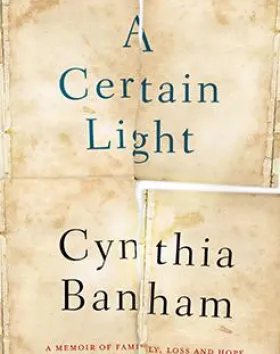
A Certain Light: A Memoir of Family, Loss and Hope – Cynthia Banham
A Certain Light: A Memoir of Family, Loss and Hope
Shortlist year: 2019
Shortlist category: Non-fiction
Published by: Allen & Unwin
With great courage and empathy, Cynthia Banham asks the difficult questions about family, about survival, and fearlessly tells the stories that are never told.
Surviving a horrific plane crash which leaves her severely and permanently disabled, unable until now to write her own story, Cynthia found that the lives of her Italian grandfather, Alfredo, and his intriguing older sister, Amelia, resonated with her own. Discovering their sacrifice, joy, fear and love, from Trieste to Germany and America, and finally to Australia, their stories mirror and illuminate Cynthia's own determination and courage in the face of overwhelming adversity.
About the author
Cynthia Banham
Cynthia Banham grew up in Sydney and worked there as a solicitor and, later, a journalist. Cynthia completed a Doctor of Philosophy and a Master in International Affairs at the Australian National University. In 2015 she was awarded a UQ Fellowship at the University of Queensland to research and teach in the School of Political Science and International Studies. Her first book, Liberal Democracies and the Torture of Their Citizens, based on her doctoral thesis, was published in 2017. She is currently a Visitor at the Australian National University's School of Regulation and Global Governance.
Judges’ comments
A Certain Light is a deeply literary memoir which lifts the genre to a higher level. Banham's study of the complex responses to great life-shaping tragedies is revealing and inspiring. Surviving a horrific plane crash which leaves her severely and permanently disabled is, as it turns out, one of the many challenges in her life. This shattering traumatic event and its aftermath provide the lens and focus to examine her multidimensional life and enables her to work through her complicated and difficult relationship with her mother and her God. There is catharsis in re-examining her life and history in consequence of these transformative events. A Certain Light is a sharp, unflinching account of being human, for the plane crash removed all artifice and stripped away from her former layers of politeness. This is an unusual memoir in which the author is prepared to reveal her vulnerability, her constant and unrelenting pain, physical, emotional and even spiritual. More than a standard autobiography, this is an exposure of her inner self, as she re-examines her family through the prism of trauma and its lasting legacy.
Fiction
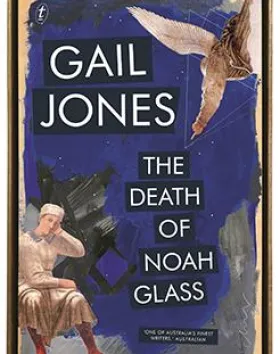
WINNER: The Death of Noah Glass – Gail Jones
The Death of Noah Glass
WINNER
Shortlist year: 2019
Shortlist category: Fiction
Published by: Text Publishing
The art historian Noah Glass, having just returned from a trip to Sicily, is discovered floating face down in the pool at his Sydney apartment block. His adult children, Martin and Evie, must come to terms with the shock of their father’s death. But a sculpture has gone missing from a museum in Palermo, and Noah is a suspect. Gail Jones's mesmerising new novel tells a story about parents and children, and explores the overlapping patterns that life makes. The Death of Noah Glass is about love and art, about grief and happiness, about memory and the mystery of time.
About the author
Gail Jones
The author of seven novels and two collections of stories, Gail Jones is one of Australia's most celebrated writers. Her work has been translated into twelve languages, awarded several prizes in Australia. Internationally her fiction has been longlisted for the Man Booker Prize and the Orange Prize and shortlisted for the International IMPAC Dublin Literary Award and the Prix Femina Étranger.
Judges’ comments
Gail Jones's The Death of Noah Glass opens with a body floating in a swimming pool and remains, at one level, a gripping mystery that investigates an Australian art historian's death and his connection to an Italian art theft. However, Jones's seventh novel also epitomises her talent for writing finely layered fiction that draws on deep knowledge of visual arts, cinema, and literature, including the Italian detective novel, as she lightly drops allusions and images that enrich the narrative. Her restrained, observant prose sensitively plumbs the grief of Glass's adult children—an artist and a philosopher—as they seek to understand their father and thus themselves. The action moves between vivid locales—Sydney, Western Australia, Sicily—and between past and present. This is a highly accomplished novel about the unknowability of others, even those closest to us, and the consolations of art, by an author of distinctive and fully matured style.

Saudade – Suneeta Peres da Costa
Saudade
Shortlist year: 2019
Shortlist category: Fiction
Published by: Giramondo Publishing
A coming-of-age story set in Angola in the period leading up to the colony's independence, Saudade focuses on a Goan immigrant family caught between complicity in Portuguese rule, and their dependence on the Angolans who are their servants. The title speaks to the melancholy longing for homeland that haunts the characters, and especially the young narrator. Suneeta Peres da Costa's novella captures with intense lyricism the difficult relationship between the girl and her mother, and the ways in which their intimate world is shaken by domestic violence, the legacies of slavery and the end of empire.
About the author
Suneeta Peres da Costa
Suneeta Peres da Costa was born in Australia to parents of Goan origin. She has published and produced widely across the genres of fiction, non-fiction, playwriting and poetry. Her novel Homework was published by Bloomsbury in 1999, and her long-awaited novella Saudade was released with Giramondo in March 2018. She is the recipient of numerous literary fellowships and awards, including a Fulbright Scholarship and the BR Whiting Studio Residency in Rome.
Judges’ comments
Suneeta Peres Da Costa's—Saudade— is a beautifully conceived story told from the perspective of a young Goan migrant who lives with her family in Angola during the last years of Portuguese occupation. The author's eye for vivid and telling details evokes the African setting in all its colour and richness. A sensitive portrayal of the narrator's developing consciousness and her sense of uncertainty about her place in the world, the narrative explores the themes of displacement and belonging on an intimate level, through her relationships with her mother, the more distant figure of her father, and the family's servant, Caetano. Beyond these personal relationships, it develops a nuanced understanding of the workings of race and class within a complex colonial society. Saudade is notable for the gorgeous fluency of its prose style. Its moving story is told with an elegance and concision that exemplify the virtues of the novella form.
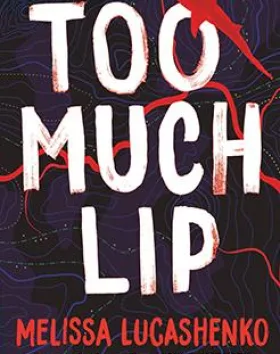
Too Much Lip – Melissa Lucashenko
Too Much Lip
Shortlist year: 2019
Shortlist category: Fiction
Published by: University of Queensland Press
Wise-cracking Kerry Salter has spent a lifetime avoiding two things—her hometown and prison. But now her Pop is dying and she's an inch away from the lockup, so she heads south on a stolen Harley. Gritty and darkly hilarious, Too Much Lip offers redemption and forgiveness where none seems possible.
About the author
Melissa Lucashenko is a Goorie author of Bundjalung and European heritage. She has been publishing books with the University of Queensland Press since 1997, with her first novel, Steam Pigs, winning the Dobbie Literary Award and being shortlisted in the NSW Premier’s Literary Awards and regional Commonwealth Writers’ Prize. Hard Yards (UQP, 1999) was shortlisted for The Courier-Mail Book of the Year and in the NSW Premier’s Literary Awards, and Mullumbimby (UQP, 2013) won the Queensland Literary Award, was shortlisted for the Kibble Literary Award, and was longlisted for the Stella Prize and the Miles Franklin Literary Award. She has also written two novels for teenagers: Killing Darcy (UQP, 1998) and Too Flash (IAD Press, 2002). In 2013 Melissa won the inaugural long-form Walkley Award for her Griffith REVIEW essay ‘Sinking below sight: Down and out in Brisbane and Logan’.
Too Much Lip won the 2019 Miles Franklin Literary Award; was shortlisted for the Stella Prize, two Victorian Premier’s Literary Awards and a NSW Premier’s Literary Award; and was longlisted in the Australian Book Industry Awards.
Judges’ comments
Melissa Lucashenko's Too Much Lip is a comic novel with a serious purpose. Set in the fictional town of Durrongo in northern New South Wales, the novel's protagonist, Kerry Salter, is an unforgettable creation: a sassy, spunky, motorbike-riding anti-hero, who often seems to find herself on the wrong side of the law. Lucashenko depicts the rough-and-tumble home life of Kerry's extended family with an affectionate humour and pokes gentle fun at the ructions within the local Indigenous community. The counterweight to this element of generous comedy is the novel's awareness of the violence and dysfunction that invariably accompany the experience of dispossession and marginalisation, the colonial origins of which give an added layer of significance to the various thefts and shady dealings that propel the story. Smartly plotted and written with demotic verve, Too Much Lip is a novel about family, community and cultural lore, and a passionate affirmation of the unbreakable Indigenous connection to Country.

Beautiful Revolutionary – Laura Elizabeth Woollett
Beautiful Revolutionary
Shortlist year: 2019
Shortlist category: Fiction
Published by: Scribe Publication
Following her conscientious-objector husband Lenny to the rural Eden of Evergreen Valley, California, Evelyn wants to be happy with their new life. It's the summer of 1968, and Evelyn Lynden is a woman at war with herself. Enter the Reverend Jim Jones, the dynamic leader of a revolutionary church called Peoples Temple. Meticulously researched, elegantly written, and utterly engrossing, Beautiful Revolutionary explores the allure of the real-life charismatic leader who would destroy so many. In masterful prose, Woollett painstakingly examines what happens when Evelyn is pulled into Jones's orbit.
About the author
Laura Elizabeth Woollett
Laura Elizabeth Woollett was born and raised in Perth, Western Australia. In 2012, she completed an honours degree in creative writing at the University of Melbourne. In 2014, she was awarded a Wheeler Centre/Readings Foundation Hot Desk Fellowship and the John Marsden/Hachette Prize for Fiction, and was chosen as one of the 2015 Melbourne Writers Festival's '30 Under 30'. Her short-story collection, The Love of a Bad Man (Scribe, 2016), was shortlisted for the 2017 Victorian Premier's Literary Award for Fiction and the 2017 Ned Kelly Award for Best First Fiction.
Judges’ comments
Laura Elizabeth Woollett's novel, Beautiful Revolutionary,explores cult psychology and the dangerous lure of the utopian ideology that attracted disciples to Jim Jones's infamous Peoples Temple. Charting the cult's dissolution from its heady socialist beginnings to mass suicide in a Guyanese compound, Woollett's vision moves beyond the charismatic figure of Jones to imagine the lives of his followers and their ultimate complicity in his crimes. Woollett achieves psychologically complex portraits of her two protagonists—minister's daughter Evelyn and conscientious objector Lenny—as they are indoctrinated into a degrading system of punishment and reward that delivers dire consequences for their marriage and sense of selfhood. Wry and incisive, but also imbued with great empathy for the trauma Jones wrought, Beautiful Revolutionary compels the reader to consider the conditions and compromises that allow groupthink to overpower individual responsibility and agency.

A Stolen Season – Rodney Hall
A Stolen Season
Shortlist year: 2019
Shortlist category: Fiction
Published by: Picador an imprint of Pan Macmillan
Adam's life has been ruined by war...A veteran of the Iraq conflict who has suffered such extensive bodily trauma that he can only really survive by means of a mechanical skeleton. Marianna's has been ruined by men...A woman who has had to flee the country after her husband lied to the wrong people. John Philip's by too much money...Until he receives a surprise inheritance in the evening of his own life. Rodney Hall presents the story of three people experiencing a period of life they never thought possible, and, perhaps, should never have been granted at all...
About the author
Rodney Hall
Rodney Hall is one of our foremost authors. He left school at sixteen for family reasons, already determined to become a writer and to educate himself by experience. Two years later he was called up for National Service. Afterwards, he set out to walk around Europe. He was thirty-one when he enrolled at university, where he studied while supporting himself as an ABC radio actor and scriptwriter. He has won two Miles Franklin Awards, his novels have been widely published and translated into many languages, and he has been twice presented with the gold medal of the Australian Literature Society.
Judges’ comments
Rodney Hall's A Stolen Season interleaves three provocative stories of characters who are grasping at life from extremis: an Australian soldier severely wounded in Iraq survives in a mechanical exoskeleton and renegotiates his collapsed marriage; a wealthy bachelor wields an inherited art collection against social propriety; and a dance teacher seeks salvation from her husband's crimes in the mysticism of Mayan culture. In a finely balanced narrative pyramid, the links between stories are subtle, sinister, and finally devastating. Hall's chiselled sentences glint with controlled anger and wit, satirising Kafkaesque institutions of power while intimately depicting the victims of war, greed, corruption, and fateful decisions. A master novelist, Hall portrays the intersection of global issues and human nature in a complex, moving work that teases and troubles the reader long after the book ends.
Children's literature
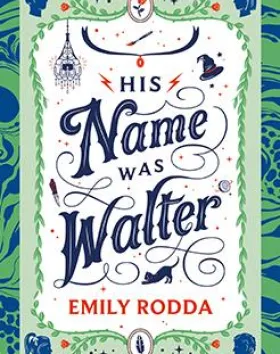
WINNER: His Name was Walter – Emily Rodda
His Name was Walter
WINNER
Shortlist year: 2019
Shortlist category: Children's literature
Published by: Angus and Robertson an imprint of Harper Collins
Once upon a time, in a dark city far away, there lived a boy called Walter, who had nothing but his name to call his own ... The handwritten book, with its strangely vivid illustrations, has been hidden in the old house for a long time. And when four kids and their teacher find the book the haunting story of Walter will be read - right to the very end ... From one of Australia's most renowned children's authors, comes an extraordinary story within a story - a mystery, a prophecy, a long-buried secret.
About the author
Emily Rodda
Emily Rodda's first book, Something Special, was published with Angus & Robertson in 1984. It marked the beginning of a career that has seen her become one of the most successful, prolific and versatile writers in Australia. Emily has written or co-authored over ninety books. Her children's books include the award-winning Rowan of Rin series as well as the outstandingly successful Deltora Quest fantasy series. Emily has won the Children's Book Council of Australia Book of the Year award a record six times, the most recent being for the extraordinary His Name Was Walter in 2019.
Judges’ comments
Emily Rodda has crafted a perfectly paced and resolved work in this quality hardcover novel for children and readers of all ages. She is in complete control of her sophisticated narrative construct. His Name Was Walter is a consummately composed mise-en-abyme or story within a story, where the inner story is embedded inside the framing story. The inner story follows the life of Walter. Walter's tale has fairy tale elements that conceal a deeper core truth. His story impinges on the framing story, where the reader enters the novel.
In the framing story, set in the 'real world' in the present, new boy Colin is on a school history excursion when the bus breaks down and he and three other students and their teacher find themselves stranded in a deserted house for the night. Colin finds an old illustrated book hidden in a secret desk drawer. This book is called 'His Name Was Walter'. The children read parts aloud, becoming absorbed in Walter's tale and becoming part of a haunted house story themselves. This highly original ghost story draws on Walter's story, entwining intricate layers to form an imaginative, metaphorically rich allegory.
In the fairy tale, Walter grows up as an orphan in a beehive before living in a rabbit warren while working in a counting house. He is unassuming and kind. As a young man he falls in love with Sparrow, a lonely girl who shapeshifts into a bird. A number of characters are shown in the guise of an animal so that they are not recognised in their own place and time, a time between two great wars when a shadow looms over the land.
Word play, visual imagery, foreshadowing and dramatic irony enhance this mesmerising tale. Themes of war, entrapment and homelessness highlight the impact of the past on the present. Characters mature and gain insight into each other as they face guilt, forgiveness and truth. All is flawlessly exposed in an audacious and satisfying final reveal.
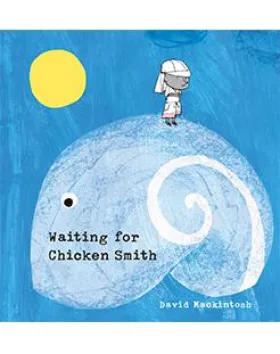
Waiting for Chicken Smith – David Mackintosh
Waiting for Chicken Smith
Shortlist year: 2019
Shortlist category: Children's literature
Published by: Little Hare an imprint of Hardie Grant Egmont
'Every year, I stay in the same cabin at the beach with my family, and every year Chicken Smith's here too, with his Dad and his dog, Jelly. But this year, something's different.' As we hang on the words of the narrator, we learn of the legendary Chicken Smith and the beachside town that has been the backdrop to their school-holiday adventures for years. But will Chicken Smith turn up this year? Or will a friendship of a different kind blossom. A story about childhood friendship, the inevitability of change and the magic of anticipation.
About the author
David Mackintosh
David Mackintosh has been writing and illustrating picture books since leaving university where he received the Macmillan Picture Book Prize. His debut work Marshall Armstrong is New to Our School was shortlisted for the Roald Dahl Funny Prize in 2011. The Frank Show was a USBBY (the United States Board on Books for Young People) Outstanding International Book in 2013 and also longlisted for the Kate Greenaway Medal. He followed these with Standing In for Lincoln Green, which was shortlisted for the Western Writers of America Spur Awards, and Little Hare's Archie and the Bear, which was named a notable book in the 2018 Children's Book Council of Australia Book Awards.
Judges’ comments
At first reading, this deceptively simple picture book describes a boy waiting for his holiday friend, Chicken Smith, to arrive in the rickety fisherman's shack next door and to fill summer with the adventure, companionship and promise of previous summers. Meanwhile, the boy's sister gets on with embracing the moment, and though she repeatedly invokes him to join her, he takes no notice. The main character, whose name we never learn, dawdles and waits, remembering with seeming hero-worship what Chicken Smith once said and what he once did, oblivious to how his reminiscences reveal what a shallow, flawed and one-sided holiday friendship the relationship had actually been. Eventually, tired of waiting, the boy reluctantly follows his excited sister. She leads him to the headland—where the boy and Chicken Smith had often, unsuccessfully, looked for whales—and gives him his very first whale sighting.
Waiting for Chicken Smith is a powerful example of the potentials of picture-book art. Author-illustrator David Mackintosh tells a salutary story of childhood betrayal, sibling loyalty and the importance of living in the moment without stooping to either articulate or explain. Interweaving three allusive layers of storytelling—the main character's first-person narration, the objective yet humorous illustrations of a typical Australian holiday community, and the dramatic irony that infuses both—Mackintosh creates an overarching narrative that is greater and more profound than the sum of its many parts, and that continues to reveal further depth, nuance and artistry with each subsequent reading.
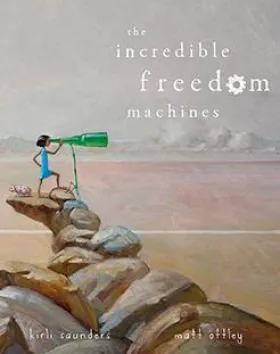
The Incredible Freedom Machines – Kirli Saunders, Illustrator: Matt Ottley
The Incredible Freedom Machines
Shortlist year: 2019
Shortlist category: Children's literature
Published by: Scholastic Australia
In this sumptuous story of exploration and breaking boundaries, a young girl uncovers her very own freedom machine—a vehicle that carries her to all kinds of wondrous places. A poetic and visual feast from talented debut author Kirli Saunders and multi-award winning illustrator Matt Ottley.
About the author
Kirli Saunders
Kirli Saunders is a proud Gunai woman. She is an award-winning, international children’s author, poet, emerging playwright and artist. Kirli manages Poetry in First Languages and Poetic Learning at Red Room Poetry. Her picture books include Children’s Book Council of Australia (CBCA) nominated and internationally published, The Incredible Freedom Machines (Scholastic Australia) and forthcoming, Our Dreaming and Happy Every After (Scholastic Australia). Her poetry Collection, Kindred was Highly Commended in Black&Write 2018. Kirli was the inaugural winner of the WA 2019 Premier’s Literary Awards – Daisy Utemmorah Award and was Runner-up in the Nakata Brophy Prize 2018. She was guest writer for the Australian Embassy, touring Jakarta and Bali in 2019. She returns as writer in residence at The Literature Centre, Fremantle to perform The Incredible Freedom Machines with Matt Ottley and the Western Australian Symphony Orchestra
About the illustrator
Matt Ottley
Matt Ottley is a multi-award-winning picture book creator and musician. This is Matt's second book with Scholastic Press. His first, Teacup (text by Rebecca Young) was the winner of the Patricia Wrightson Prize for Children's Literature, 2016, and has most recently been named as the International Board on Books for Young People (IBBY) Australia Honour Book for IIlustration, 2018.
Judges’ comments
This beautiful picture book celebrates creativity and the ability of the imagination to transcend the boundaries of our everyday lives.
While searching for her very own freedom machine, a young girl encounters many visually stunning—and obviously powerful—space-age vehicles that are skilfully juxtaposed against the shabbiness of the caravan park where she lives, a place that is bleak and 'sawn together by boundaries'. Many of these amazing freedom machines are not quite right for her but she persists and ultimately finds a vehicle ready to transport her (and the reader) to places of wonder and unlimited possibility. These 'most abundant untouched places' enable her to realise her dreams and help her return to her own world feeling whole. In a sense her journey mirrors the experience of many readers as they search for the most appropriate stories that will help them find their own identities and a sense of completeness.
A seamless collaboration between words and surreal, often whimsical images, this book is a work of art. From the outset the cover communicates the courage and determination of the young girl with her bold stance and outward gaze. While the words are minimalist, each is eloquent and thoughtfully chosen by first-time Indigenous author Kirli Saunders. Coupled with the vibrant images, many reaching across double pages, the story creates a sense of the vastness and beauty of the Australian landscape. Colour and light are used skilfully and each opening reveals additional layers and ambiguities that can and should be explored at length. Multiple readings are a must. The images are brilliantly rendered by award-winning illustrator Matt Ottley, who has embedded inter-pictorial references to his own work as well as to that of a number of other famous Australian artists including Russell Drysdale, Fred Williams and Shaun Tan.
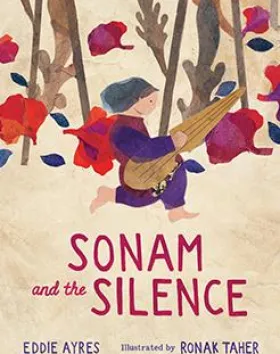
Sonam and the Silence – Eddie Ayres, Illustrator: Ronak Taher
Sonam and the Silence
Shortlist year: 2019
Shortlist category: Children's literature
Published by: Allen and Unwin
In Taliban-ruled Afghanistan, Sonam's world is dark and silent. Then one day, she follows a magical melodious sound to a walled garden, and her world is silent no more. The sound is music, and it lifts her up amongst the stars and takes her deeper than the tree roots in the earth. How can she hold on to this feeling in a world where music is forbidden?
A lyrical fable-like story by the well-known musician, author and broadcaster Eddie Ayres, about the irrepressible power of music.
About the author
Eddie Ayres
Eadric (Eddie) grew up in England, studied music and has adventured throughout the world as a viola and cello player. Eadric's big desire in life is to introduce classical music to as many different people as possible, so for ten years he worked as a broadcaster with the ABC, ultimately presenting the popular breakfast programme. Eventually Eadric's adventurous spirit demanded more, and he moved to Afghanistan to teach music there for a year. Eadric was born Emma, and transitioned just before his fiftieth birthday.
About the illustrator
Ronak Taher
Ronak Taher is an Iranian-Australian artist born in 1984. She finished her bachelor of Graphic Design at the University of Tehran, also holds a Master of Illustration and Animation from the Azad University of Tehran. In 2013 she was celebrated as one of the 300 upcoming world talents in film industry at the Berlin Film Festival. Ronak also works in the fields of graphic design, illustration and sculpture. She has had over six solo and group visual art exhibitions and has illustrated more than eight books for children and young adults.
Judges’ comments
This beautifully written and illustrated picture book is a critique of the silencing of the music and its importance, a celebration of the arts in our humanity, as well as paying tribute to what Andrew Upton (in conversation with Robyn Ewing in 2013), has called the Arts as disobedience. Both the writing and the illustrations are multi-layered.
As the author's note makes clear, this is a book based on fact. In the grim years following the triumph of the Taliban in Afghanistan, all forms of music were banned. This book imagines one small girl—Sonam—meeting an old man who defies the ban and plays music, because, he says, when it is forbidden, is the time 'when we need it most'. The old man represents harking back to the older culture and the importance of holding on to traditions. From him, Sonam learns to play the rubab, a traditional instrument made from the wood of a mulberry tree.
Eddie Ayres worked for a year in Afghanistan, teaching music in the National Institute of Music and one of his pupils there was called Sonam—the inspiration for this book. Adding further depth to this story are the rich, sophisticated and beautiful illustrations. These are by Ronak Taher, an Iranian-Australian illustrator. She has used a mixture of media to give layers and texture to her illustrations. The layout of double-page spreads throughout allows a panoramic view of each scene. There are symbols of freedom, joy and play with gardens, birds, Sonam running, her hair flying and sitting in a stylised pomegranate tree, making music on her rubab.
Things change, however, when her brother hears her humming the music she has learnt from the old man. He takes away the rubab and she becomes withdrawn, illustrated by her bound in a long chord, the pomegranate tree no longer a safe haven but with fruit scattered everywhere. The colours change from the rich greens, purples and blues to brown and black as a menacing image of war with planes, bombs and shouting soldiers symbolises the invasion of Afghanistan. There is noise, lots of noise but, without music, it seems silent to Sonam who goes to look for the old man, only to find him gone and the pomegranate tree withered. As a symbol of life, though, there is just one fruit on the tree from which Sonam can grow more trees. Even better, as a wonderful surprise to her and to the reader, as she digs she discovers buried beneath the tree, a box with her rubab, carefully concealed and protected by her brother. This is another symbol of new life and love. She plays the instrument again, bringing back the music and the precious memories of the old man who will always be with her through the music she plays. The music here is metaphoric for language.
The story is written in the present tense, highlighting the fact that a story like this can and does happen at all times. The book gives a voice to children enduring war and is dedicated by the illustrator to 'all kids experiencing war who will never have a chance to read this book'.

The Feather – Margaret Wild, Illustrator: Freya Blackwood
The Feather
Shortlist year: 2019
Shortlist category: Children's literature
Published by: Little Hare an imprint of Hardie Grant Egmont
A story about hope, kindness and redemption set in a grey dystopian world. When a great feather drifts from the leaden sky, two children recognise its extraordinariness and take it to the village for its protection. The villagers, however, want to encase it, upon which the feather loses its radiance. The children take it home and care for it through the night. In the morning it is again radiant, and when they set it free it leaves behind the first signs of blue sky and colour. The ambiguous ending invites multiple interpretations about the effects of selflessness and kindness.
About the author
Margaret Wild
Margaret Wild was born in 1948 in Eschew, a small town in South Africa, and came to Australia in 1972. Before becoming a full-time writer, Margaret was a journalist for newspapers and magazines and then she worked for sixteen years as a book editor in children's publishing. Margaret's books explore a diverse range of themes, but she is particularly noted for exploring issues of identity, trust, and death. Margaret latest picture books with Little Hare include The Stone Lion (illustrated by Ritva Voutila), No More Kisses (Nina Rycroft) and Hush, Hush (illustrated by Bridget Strevens-Marzo).
About the illustrator
Freya Blackwood
Freya Blackwood was born in Edinburgh and grew up in Orange in NSW. After graduating from University of Technology Sydney in Visual Communications, Freya worked in the film industry. She began illustrating picture books in 2002 and has since been shortlisted for, and won many prestigious awards, including the Kate Greenaway Medal in 2010. Freya works and creates in her backyard studio.
Judges’ comments
A feather, a poignant symbol of hope, as epitomised in the well-known Emily Dickinson's poem, is at the centre of this thought-provoking and moving allegory.
When a feather falls from the darkened sky, Maria and Nico are seized by the wonder of it. The feather is huge, but also soft and light, and the children's joy of discovery has them hurtling to the village to share their miraculous find, so full of possibility. Here, in the grey world of a timeless village, the people gather. For some, the feather conjures up memories of light-filled days gone by, but to the people of power it is something to be shut away. Soon the feather becomes stained and is reviled as a 'hideous object'. But not to Maria and Nico. They can still see the hope and possibility in it. They haul it home, nurture it and ultimately help to set it free.
The compelling cover art and intriguing endpapers draw the reader in to this powerful work, where words and pictures work seamlessly together to tell a layered and evocative tale. Margaret Wild's text is spare, poetic and carefully chosen. It is rich in symbolism and metaphor and explores themes of hope, freedom, joy and possibility. The children's ability to accept the ambiguity and magic of the feather, to nurture it when it is sullied and never to lose hope makes a powerful statement, especially when juxtaposed with the narrow view and disdain of the townsfolk. The ending is cleverly open, granting readers the chance to ponder and to draw their own conclusions.
Freya Blackwood's art is stunning: considered and assured, and with much to discover from repeated viewings. Her figure drawing is wonderfully loose and emotive, and she uses colour, light and shade, perspective and scale to great effect, enriching the text and the symbolism of the feather. The feather itself is enormous—larger than the children—which immediately creates a sense of possibility, power and magic. The children are depicted as beacons of hope for the future through the stark contrast of the vast greyness of the village with the small pockets of oranges and reds of the children's clothing and the circle of light that surrounds them. The reader is gifted with three wordless spreads, where a shift from dark to light speaks volumes.
This is a magnificent picture book, brought to life through the collaboration of two masterful storytellers, consummate experts in their fields.
Poetry
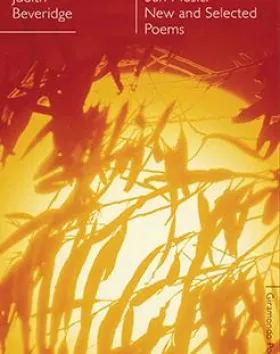
WINNER: Sun Music: New and Selected Poems – Judith Beveridge
Sun Music: New and Selected Poems
WINNER
Shortlist year: 2019
Shortlist category: Poetry
Published by: Giramondo Publishing
Beveridge is an exacting poet, and the form of her poems contains and intensifies their expression of emotion. Their clarity and drama, their musical language and often playful metaphors, give them an immediate appeal. This is poetry of wonder and enchantment, compassionate in its identification with the ungainly and the vulnerable, the simple and the poor, and insistent in its emphasis on the dignity and self-possession of all that it observes.
About the author
Judith Beveridge
Judith Beveridge is one of Australia most acclaimed poets, taught in high schools and universities, winner of the NSW and Victorian Premiers' Awards, a highly regarded critic, editor and teacher of poetry. She has published six collections of poetry which have won major prizes. She is a recipient of the Philip Hodgins Memorial Medal and the Christopher Brennan Award for lifetime achievement in poetry. She was poetry editor for Meanjin from 2005 to 2015, and co-editor of the anthology Contemporary Australian Poetry (Puncher & Wattmann, 2016). She teaches in the postgraduate writing program at the University of Sydney.
Judges’ comments
With joyous fluency and formal mastery, Beveridge's Sun Music: New and Selected Poems draws the reader into an electrifying encounter with language, guiding us through its flexure and torsion, its exacting grace. The selection of new poems in Sun Music linger on both the human and animal worlds, from the delicate texture of Banaras silk sari to cane toads to the act of juicing sugar cane, and are marked by their clarity of perception and attentiveness to textural and sonic detail. The titular elegy, 'Sun Music', is one of several where the poet turns to more personal territory, mourning the loss of a father who found redemption from drinking through bird-watching, finding himself 'intoxicated / by the sea, the sky, the spindrift a new / spell he could steer his life by'. Beveridge takes a similarly ecstatic pleasure in the elements in many of these new poems, which balance the clamouring external landscape with a meditative, introspective interior world that increasingly seeks a language for loss and grief.
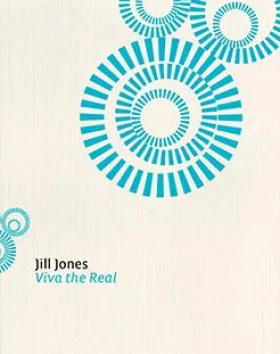
Viva the Real – Jill Jones
Viva the Real
Shortlist year: 2019
Shortlist category: Poetry
Published by: University of Queensland Press
Viva the Real is Jill Jones' eleventh book of poetry. It is lyrical, haunting and urgent. The poems explore body and place through a lively mix of the playfully inventive and more formal poetic forms, and celebrates resilience and continuity in ordinary experience in ways that are intimate, comic and elegiac.
About the author
Jill Jones
Jill Jones was born in Sydney and has lived in Adelaide since 2008. She has published ten full-length poetry books and a number of chapbooks, including The Beautiful Anxiety, which won the Victorian Premier’s Literary Award for Poetry in 2015, and Breaking the Days, which won the Whitmore Press Manuscript Prize in 2014 and was shortlisted for the Kenneth Slessor Poetry Prize in 2017. She has also won the Kenneth Slessor Poetry Prize and the Mary Gilmore Award. Her work is published widely in Australian and international anthologies, magazines and periodicals, and has been translated into Chinese, Dutch, French, Italian, Czech, Macedonian and Spanish. She has worked as a film reviewer, journalist, book editor and arts administrator. In 2014 she was poet-in-residence at Stockholm University. She currently teaches at the University of Adelaide where she is also a member of the J.M. Coetzee Centre for Creative Practice.
Judges’ comments
Viva the Real by Jill Jones is an heroic celebration of the everyday: doors, floors, a fence are each the thing itself and the word's resonance in the mind of the reader. For Jones the poem is an artefact freeze-framing thought: she is interested in the connections between the quotidian, attentiveness, and the resourcefulness of the poem to make legible our familiar. The mundane may be ordinary, monotonous even, but it needn't be boring: 'What kind of reveries do you think you deserve?' the collection asks, before delivering you 'dreams lean as leopards,' 'blossoms that pour like stars,' and 'flames, fruit, tea leaves and the sound of news pages turning side by side.' An antidote to distraction, Viva the Real is a marvellous contribution to the poetics of everyday life: it magnifies the moment and resonates long after reading.

Newcastle Sonnets – Keri Glastonbury
Newcastle Sonnets
Shortlist year: 2019
Shortlist category: Poetry
Published by: Giramondo Publishing
Once considered a masculine working-class heartland, Newcastle is now acclaimed as one of the hipster cities of the world. In the sequence of sonnets that compose her homage to Newcastle, Glastonbury celebrates the city's oddities and contradictions, remixing the material effects of post-industrial gentrification with the vernacular of social media. An antipodean, regional, queering of Ted Berrigan's New York-based The Sonnets, Glastonbury's poems embrace the city's DIY chutzpah and the swipes, likes and filters of internet culture. This is Newcastle in cosplay mode, part eggs benedict, part pebblecrete, where a coal ship named 'Fiction' is being towed into the harbour.
About the author
Keri Glastonbury
Keri Glastonbury is a Senior Lecturer in Creative Writing at the University of Newcastle. Her poems have been widely published in magazines and collections. She has been the recipient of the Australia Council's BR Whiting Residency in Rome and an Asialink Literature Residency in India. Her previous poetry collections include Grit Salute (Papertiger, 2012).
Judges’ comments
Keri Glastonbury's Newcastle Sonnets is a post-industrial love song to the city of Newcastle: once working-class heartland, now a world-topping hipster cities. To Glastonbury's eye the city is a 'chiaroscuro of coal dust and sand'—'plum blossoms line Pinnaroo Drive' while 'a shopping trolley rusts at the rocks'. Glastonbury's sonnets, far from stultifying, are energetic and playful as they enact the associative freedoms of everyday speech. Her tone—wry, not sappy, politically savvy, not didactic—acts as a stabilising force beneath the nervous surfaces of the poems, allowing her to say whatever pops into her head without appearing random. Variously the poems address lovers and friends and frequently incorporate comical cameos from the political class—Tony Abbott, Bob Carr, Penny Wong's speechwriter, and many more—but at least one politically apathetic Novocastrian remains: having none of it, she folds her 'voting slip into an origami crane'.
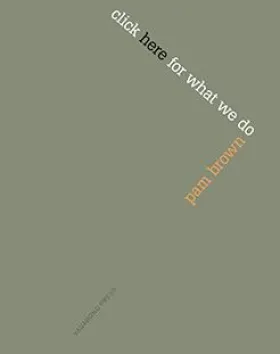
Click Here for What We Do – Pam Brown
Click Here for What We Do
Shortlist year: 2019
Shortlist category: Poetry
Published by: Vagabond Press
Click Here for What We Do is a cluster of four loosely connected poems that are not only sceptical of the status quo's serial mendacities and hype but, in a way, they also attempt a coming to terms with the erosion of the idealistic conditions that once made non-mainstream culture, including poetry, so viable and, even, necessary.
About the author
Pam Brown
Pam Brown's many books of poetry include Text Thing, Authentic Local, Home by Dark and Missing Up. She has been writing, collaborating, editing and publishing in diverse modes both locally and internationally for over four decades. Pam Brown's collection Dear Deliria (Salt, 2003) received the annual New South Wales Premier's Award for poetry. She has earned a living in a range of occupations.
Judges’ comments
The four long poems in Click Here for What We Do are constructed from scraps of language, ranging from commonplace phrases to literary allusions, which have been broken down, twisted and rearranged into surprising new shapes. In their wry, accretive fashion, they seem to mimic the disjointed juxtapositions of our technologically mediated relationship to information, like random clicks between websites or the steady drip of a social-media feed. Though the poems appear to unfold casually, almost accidentally, they are artfully patterned and scrupulous in their awareness of the essential strangeness of language itself, allowing the reader to appreciate both the elusiveness and the palpability of the medium. The collection bursts with jokes, wordplay, curious facts, and striking thoughts expressed with the evident delight of an unexpected discovery. Its vibrant and brilliantly angular poems are full of surprising rhythmic effects, their tone by turns playful, arch, knowing and amused.
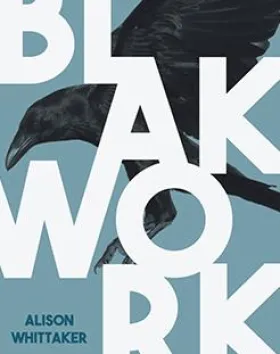
Blakwork – Alison Whittaker
Blakwork
Shortlist year: 2019
Shortlist category: Poetry
Published by: Magabala Books
A stunning mix of memoir, reportage, fiction, satire, and critique composed by a powerful new voice in poetry. Alison Whittaker's Blakwork is an original and unapologetic collection from which two things emerge; an incomprehensible loss, and the poet's fearless examination of the present. Whittaker is unsparing in the interrogation of familiar ideas—identifying and dissolving them with idiosyncratic imagery, layering them to form new connections, and reinterpreting what we know.
About the author
Alison Whittaker
Alison Whittaker is a Gomeroi multitasker from the floodplains of Gunnedah in NSW. Between 2017–2018, she was a Fulbright scholar at Harvard Law School, where she was named the Dean's Scholar in Race, Gender and Criminal Law. Alison's work has been published in The Sydney Review of Books, Southerly Journal, Seizure, Overland, Westerly, BuzzFeed, Griffith Review, The Lifted Brow, Meanjin and Archer. Her debut poetry collection, Lemons in the Chicken Wire was awarded the State Library of Queensland's black&write! Indigenous Writing Fellowship in 2015 and was published by Magabala Books in 2016.
Blakwork was also shortlisted in the Poetry category for Victorian Premier’s Literary Awards 2019.
Judges’ comments
Exciting, formally ambitious and innovative, Alison Whittaker's Blakwork interrogates the past and present legacy of colonialism through the frames of a range of different kinds of work, including 'whitework,' 'storywork,' 'selfwork,' 'bloodwork,' and 'heartwork.' Blakwork'sfield of vision is broad—its subjects range across Indigenous deaths in custody, Native Title legislation, queer desire, live exports, immigration policies, family history, and the relationship between community and Country—but the poems are united by Whittaker's incisive critique of the ways in which language, as an instrument of policy, can oppress and dispossess. Whittaker repurposes and satirises legal, technological and bureaucratic language, remixing and redacting to disrupt its received usage and allow the reader to see it afresh. Her masterful usage of vernacular, slang, and her forays into the lexicon of the internet, text speak, and emojis bring her lively contemporary voice into crisp focus.


